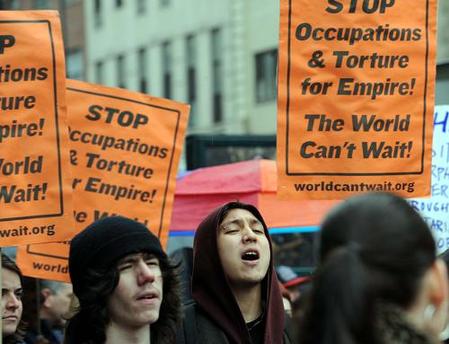
|
|
US anti-war demonstrators stage a protest in New York, the United States, March 19, 2009, marking the 6th anniversary of the start of Iraq war. [Xinhua]
|
Lasting trauma
However, as the country's most costly military operation since World War II and the second-longest external conflict in US history, the Iraq war will be a lasting trauma for America with profound economic, political, military and social implications.
According to the Congressional Budget Office, the US government has appropriated 700 billion US dollars for the war up to Sept. 30 this year.
Taking into account the Obama administration's latest war funding request for fiscal year 2010 that begins on Oct.1, the price tag will approach 800 billion dollars.
If the hidden costs of weapon replacements and compensation for US soldiers are included, the war's total costs will be between 2 and 3 trillion dollars and the economic effect will last much longer than the war itself, according to the estimate of leading economists.
Meanwhile, although the US casualty rate in Iraq has slowed down since a spike in 2007, it is still adding up.
More than 4,200 US troops have been killed over the past six years and there will be more causalities since the war will not be wrapped up at least for 18 months, a timeline which Obama said the US combat missions in Iraq will end by then.
The US war machine is not likely to emerge from the war stronger with worn-out equipment, low morale and wide-spread health problems among soldiers.
The New York Times recently reported that the Pentagon is rethinking its long-time strategy of "being ready for two wars" because of the mixed results from the Iraq war.
As many as 20 percent of all US military forces could have brain injuries as a result of the long wars in Iraq and Afghanistan.
Political divisions on the war is not going to be ended even it is not a top concern for voters.
Obama has frustrated some of his staunch anti-war supporters in the presidential race of 2008 due to his failure to stick to the campaign promise to withdrawal all US combat troops within 16 months after his swearing in.
While announcing his war plan last month, the president opted for a 18-month timetable to moderate military commanders' resistance to a quick withdrawal from Iraq.
More importantly, although the general view on the war is optimistic, Democrats and Republicans are still on opposite sides on the nature of it.
Polls show that about 82 percent of Democrats still believe the war is a mistake, but the majority of Republicans do not agree.